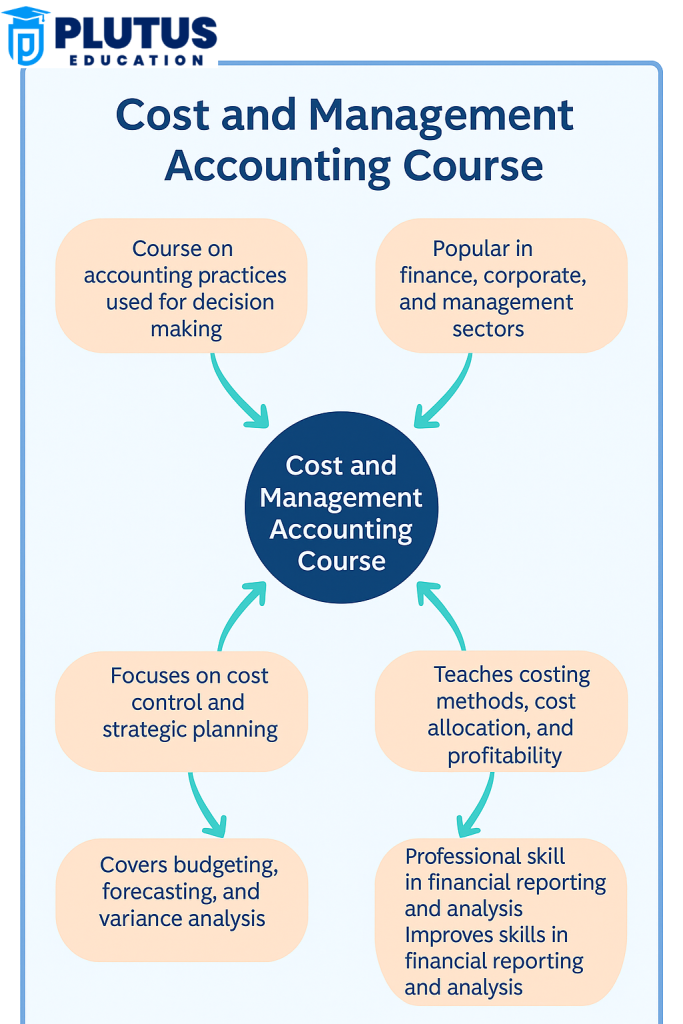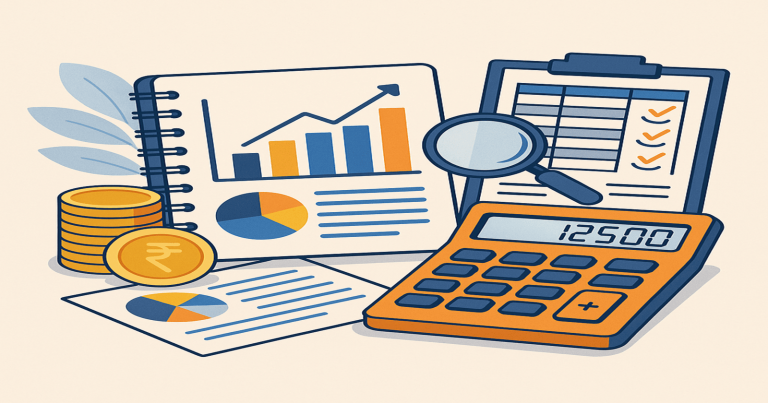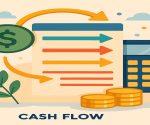The Cost and Management Accounting course equips an individual with the necessary skills and knowledge for making financial decisions within a company. The subject talks about the principles and practices regarding accounting, control of costs, budgeting and financial analysis, and management. It entails critical accounting methods that help students prepare for developing organizational choices, guaranteeing profitability and effectiveness. It is the course to take students who wish to have a successful career in accounting, finance, or management, and it is highly advisable for those who desire to understand how to utilize financial resources effectively in a business environment.
Introduction to Cost and Management Accounting Course
The Cost and Management Accounting domain is crucial, regardless of business size, to analyze and manage costs. The paramount aim of the course is to instruct the students on how to collect and analyze financial data to assist businesses in cost optimization and profitability enhancement.
What Is Cost and Management Accounting?
- Cost Accounting involves the identification, measurement, and analysis of costs in order to help organizations manage and control them. This includes direct costs (such as raw materials and labour) and indirect costs (such as overhead).
- Management Accounting focuses on the use of cost information to make informed management decisions. It helps managers plan, control, and evaluate business activities.
In a Cost and Management Accounting Course, students learn about cost behaviour, cost allocation, budgeting, variance analysis, and decision-making techniques such as break-even analysis. They also learn how to create financial reports that support managerial decisions and enhance the efficiency of operations.
Key Areas of Focus
- Costing Techniques: Traditional methods such as job order costing, process costing, and activity-based costing.
- Budgeting: The preparation of comprehensive budgets to plan for revenues and expenses.
- Variance Analysis: Identifying differences between budgeted and actual costs to control costs.
- Financial Reporting: Preparing financial statements for internal management use.
- Decision Making: Applying financial information to make key decisions such as pricing, investment, and cost control.

Core Topics Covered in Cost and Management Accounting Course
A Cost and Management Accounting Course covers a range of subjects that are essential for understanding and applying accounting concepts in a business context. Below are some of the core topics that are typically included in such a course:
1. Introduction to Cost Accounting
- Understanding the classification of costs into fixed, variable, and mixed costs.
- Detailed study of cost behaviour and cost allocation methods.
- Analysis of cost-volume-profit relationships to determine how cost changes affect profitability.
2. Costing Methods
- Job Order Costing: Used for custom products, where costs are traced and assigned to specific jobs.
- Process Costing: Used for mass-produced products, where costs are averaged over units produced.
- Activity-Based Costing (ABC): An advanced costing method that assigns costs to activities based on their consumption of resources.
3. Budgeting and Planning
- Budget preparation of financial as well as operational for short-term and long-term planning.
- Variance analysis to contrast actual financial performance with budgetary figures and adjust accordingly.
4. Cost Control and Analysis
- Techniques for controlling and reducing costs, including the use of cost control charts and variance reports.
- Identifying inefficiencies in production processes and operations.
5. Decision-Making for Managers
- Break-even analysis and margin analysis to help make pricing, production, and investment decisions.
- Application of marginal costing and relevant costing to solve real-world business problems.
6. Management Accounting
- Cost allocation and performance measurement.
- Financial performance analysis using ratio analysis and other performance metrics.
Through the study of these key topics, students learn to manage and control costs effectively, improve profitability, and make better financial decisions for businesses.
Skills Acquired Through Cost and Management Accounting Training
The Cost and Management Accounting Course teaches you very useful skills that are essential to excel in the accounting and finance industry. Below are some of the most important skills you can learn from this course:
1. Analytical Thinking
- Skill in interpreting and using financial data to make informed decisions.
- Skill to recognize trends, patterns, and cost behaviour to maximize business performance.
2. Financial Reporting
- Ability to prepare precise financial statements, including balance sheets, profit and loss accounts, and cash flow statements.
- Skill in interpreting and reporting on financial data to the management and stakeholders.
3. Cost Control and Budgeting
- Skill in cost control methods to monitor and reduce wastage of funds.
- Ability to prepare and deal with budgets so that available resources are used efficiently.
4. Problem-Solving Skills
- Skill to recognize and resolve intricate cost control business issues and offer suitable solutions.
- Applying decision-making methods like break-even analysis, marginal costing, and price policy.
5. Strategic Management
- Capacity to make possible the alignment of financial goals and strategic goals of companies.
- Skill in offering financial projections and modelling to predict future financial performance.
6. Application of Accounting Software
- Knowledge of contemporary accounting software tools for cost management and cost analysis.
- Ability to use Excel and other data analysis software for budgeting, forecasting, and decision-making.
By completing a Cost and Management Accounting Course, students gain these skills and are prepared to work in a wide variety of roles within accounting, finance, and management.
Career Opportunities After Completing a Cost and Management Accounting Course
A Cost and Management Accounting Course provides access to many career prospects in both private and public sector organizations. Cost and management accounting specialists are highly sought after within most industries.
1. Management Accountant
A management accountant applies cost accounting concepts to assist organizations with well-informed decision-making. Budgeting, cost analysis, and financial planning are their duties.
Average Salary: $70,000–$120,000 annually, depending on location and experience.
2. Cost Accountant
A cost accountant is a professional who monitors and manages costs in manufacturing and production firms. They make sure that the costs are kept accurate and help to undertake cost control measures.
Average Salary: $60,000–$90,000 annually.
3. Financial Analyst
Financial analysts apply financial information, such as cost reports, to assist businesses in making investment and operational decisions. They can work in any industry, including banking, insurance, and consulting.
Average Salary: $60,000–$100,000 a year.
4. Internal Auditor
Internal auditors review the financial and operational procedures in a firm, verifying correctness and adherence to rules. They tend to target cost efficiency and financial risk control.
Average Salary: $55,000–$90,000 a year.
5. Budget Analyst
A cost analyst assists companies in creating and maintaining budgets in order to allocate resources effectively and achieve financial goals.
Average Salary: $55,000–$85,000 annually.
Moreover, a Cost and Management Accounting Course can be a stepping-stone for higher-end certifications, such as the Certified Management Accountant (CMA) certification, which further improves career and salary prospects.
Cost and Management Accounting Course FAQs
What is included in a Cost and Management Accounting Course?
The course covers key topics such as cost classification, budgeting, financial analysis, decision-making tools, and management accounting.
What skills can I acquire through a Cost and Management Accounting Course?
Key skills include analytical thinking, financial reporting, cost control, problem-solving, strategic management, and the use of accounting software.
What career opportunities are available after completing a Cost and Management Accounting Course?
Career opportunities include roles such as management accountant, cost accountant, financial analyst, budget analyst, and internal auditor.
How does the Cost and Management Accounting Course help in decision-making?
The course teaches decision-making tools such as break-even analysis and marginal costing, which help in making strategic financial decisions.
Is certification necessary after completing a Cost and Management Accounting Course?
While not mandatory, earning certifications like the CMA (Certified Management Accountant) can significantly enhance your career prospects and earning potential.


